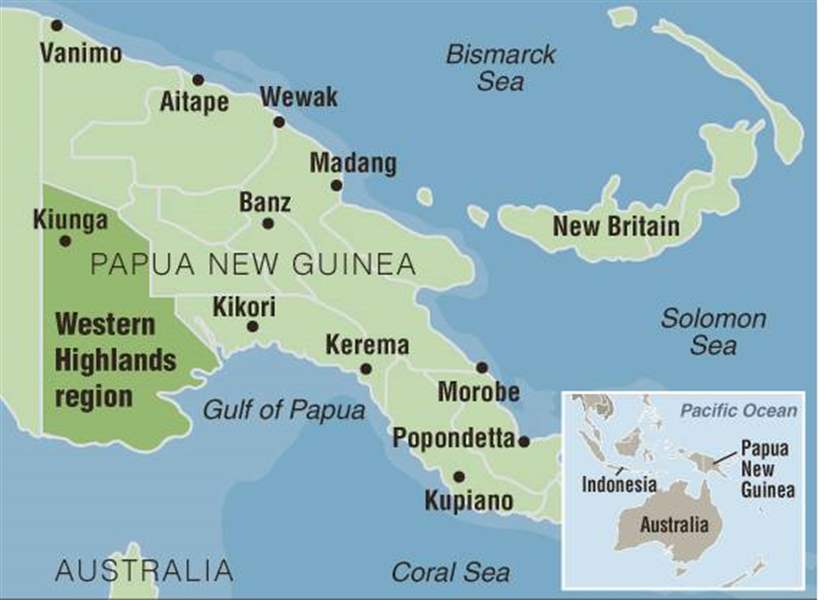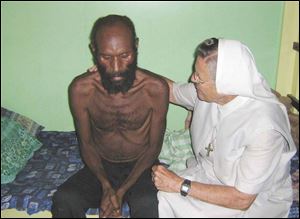
Nun makes AIDS patients her mission
8/4/2007
The Toledo nuns established a school and pastoral ministry in Papua New Guinea in 1961.

Sister Rose Bernard Groth of the Sisters of Notre Dame comforts an HIV/AIDS patient in Banz, Papua New Guinea.
Once every six months or so, Sister Rose Bernard Groth throws a Celebrate Life party at the Sisters of Notre Dame s mission in Papua New Guinea.
We decorate it with balloons, serve refreshments, play music, people dance. It s a wonderful time, said Sister Rose, a Toledo native who has been a missionary since 1964.
The Celebrate Life parties are for people with HIV and AIDS, to give them hope and let them know they are not alone, and that someone if nobody else, then at least Sister Rose cares about them.
We try to do it every six months. They are really happy people and it lifts their spirits when they know someone cares for them, that someone loves them, she said.
Each party is for up to 65 people, the maximum number the nuns facility can accommodate. But by the time the next Celebrate Life party comes around, 15 to 20 of those people have died, Sister Rose said,
Sister Rose said she knew when she was a first-grade pupil at St. Ann s Elementary School that she wanted to be a nun and that she wanted to be a missionary.
I don t know how I knew. But I knew, she said with a twinkle in her eye.
Feisty and straightforward by nature, she never wavered from that calling.
After joining the Toledo province of the Sisters of Notre Dame and earning an education degree from Mary Manse College, she moved to Papua New Guinea with the thought that she would never leave that Pacific island nation.

The Toledo nuns established a school and pastoral ministry in Papua New Guinea in 1961.
Although she does come back to the United States once every five years or so, the 76-year-old sister has spent the last 42 years of her life ministering to the people of Papua New Guinea.
She was back in Toledo for a few months, staying at the Sisters of Notre Dame s provincial house on Secor Road, before leaving for the mission field earlier this week.
I went over as a primary school teacher, then a high school teacher, said Sister Rose, who learned to speak fluent Melanesian Pidgin English, the prevailing dialect in the region.
We started a vocational center for girls whose education otherwise would be terminated after sixth grade. I ve worked in prison ministry, and pastoral ministry.
Since 1990, the nun has been focusing most of her efforts on helping people with HIV and the AIDS virus.
It was the furthest thing from my mind when I went there, she said. But that s how the Lord leads you. Just be open when the needs come.
Sister Rose said she read an article in Time magazine in 1985 about the AIDS crisis in Africa, and feared that the disease was something she should learn more about.
I knew that if it came here, it would spread like wildfire, she said.
Although 22 percent of the population is Roman Catholic, she said the natives don t have much of a religious background.
Polygamy is legal, promiscuity is common, and there is a local superstition, called sanguma, in which somebody else is always responsible for a death. They don t want to take responsibility, she said.
All those factors made Sister Rose realize that AIDS posed a serious threat to the people of Papua New Guinea.
Located in the Pacific Ocean north of Australia, Papua New Guinea is on the eastern side of the world s second-largest island, which it shares with Indonesia.
Its 5.5 million residents live in an area slightly larger than California, much of it mountainous, and agriculture is the primary industry.
Sister Rose said the climate in the Western Highlands is nearly perfect, with morning lows in the 50s and afternoon highs in the 80s, and humidity is low.
The weather is ideal and the scenery is beautiful, she said.
The first case of AIDS in the country was reported in 1987, she said.
Three years later, two of Sister Rose s parishioners were diagnosed HIV positive.
She has been working ever since to help comfort those who are infected with the virus, and to help prevent the spread of the disease.
Sister Rose said the rate of infection is reported to be 2 percent of the population, and that 1 percent qualifies as an epidemic. But she believes the rate is actually much higher and that many cases go unreported.
Among the ministries she runs is the Shalom Care Center, a two-bedroom house where four people with the virus stay for a week at a time.
Sister Rose teaches them about nutrition, makes sure they eat healthfully while at the home, and sees to it that when they leave they know how to counter the effects of the virus as best as possible.
I m trying to give them hope. They can live perfectly normal lives, they don t have to die right away, she said. They can lead a good life even though they have the virus.
Some of the HIV victims she counsels are suicidal, she said.
I just keep talking to them until I see a smile. Then I know there s hope, she said.
The Shalom Care Center houses people every other week; on the alternate weeks Sister Rose goes to the villages to visit with people who have HIV and AIDS.
I can t always expect them to come to see us. And when we go to the villages, we can see what they are going to meet with when they come back home. The whole family is affected by the disease, she said.
She brings them medicine and counsels them.
I have to have a cover story for their confidentiality. I m not exactly incognito! she said with a laugh, because she always wears her gray and white habit.
We test their blood, and if they are negative, we rejoice and try to help them stay negative. If they re positive, we give them medication and counsel with them, she said.
The country has only recently started getting anti-retroviral (ARV) medicines that can slow the advance of AIDS. She said she has seen people on the point of death surge back to life after getting a dose of ARV.
But those drugs are expensive about $200 a month, she said, in a nation rife with poverty.
There are five American nuns and 12 Papua New Guinea nuns at the mission in Banz, living in a convent without air conditioning or even fans.
The sisters grow most of their own food.
We try to be self-sufficient, she said. I m a city girl, but I learned to drive a tractor a small one.
Their water supply comes from rainwater collected from the convent s rooftop.
The telephones work sometimes. Power fails often, but we have a generator, Sister Rose said.
When she first got there and something needed to be repaired, she said the sisters would call a plumber or a carpenter and stand beside them while they worked.
You paid attention and learned so that the next time, you could do it yourself, she said.
Sister Rose said she didn t experience culture shock when she moved to Papua New Guinea, but gets it now when she comes back to the United States.
When I come back and see the changes, that s when I get culture shock. People have changed. Values have changed.
But she said she loves driving on smooth roads for a change, and admits that the first thing she does when she comes to America is stop at a McDonald s restaurant.
In Papua New Guinea, Sister Rose has found herself in some dangerous situations. A robber once put a gun to her head, she said, and she was car-jacked another time.
She said she believes that people s prayers have helped her through the tough times.
Prayers are very, very important, she said.
More information about the Sisters of Notre Dame and their overseas missions is available online at www.snd1.org or by calling the Toledo provincial center, 419-474-5485.
Contact David Yonke at:dyonke@theblade.comor 419-724-6154.